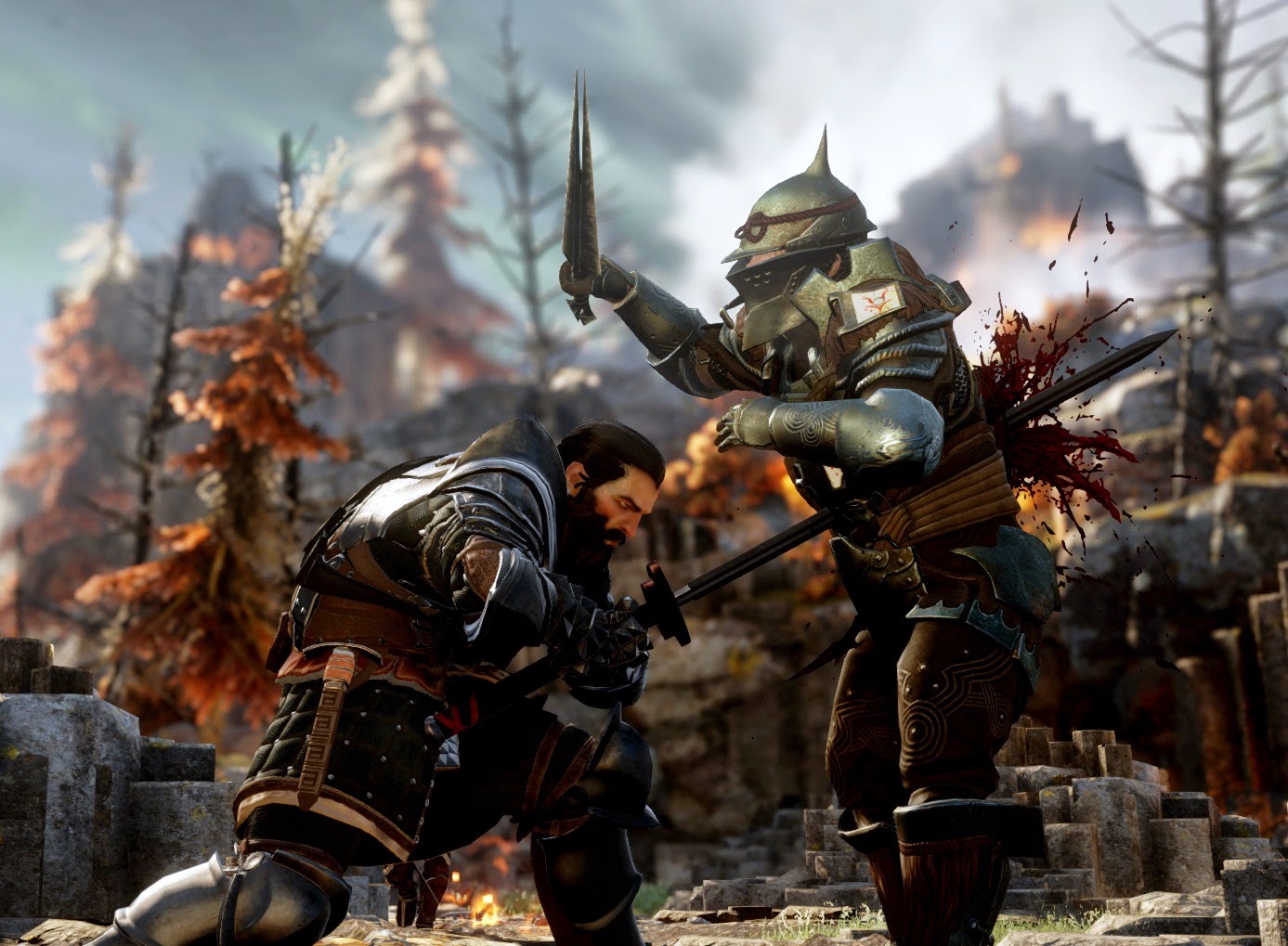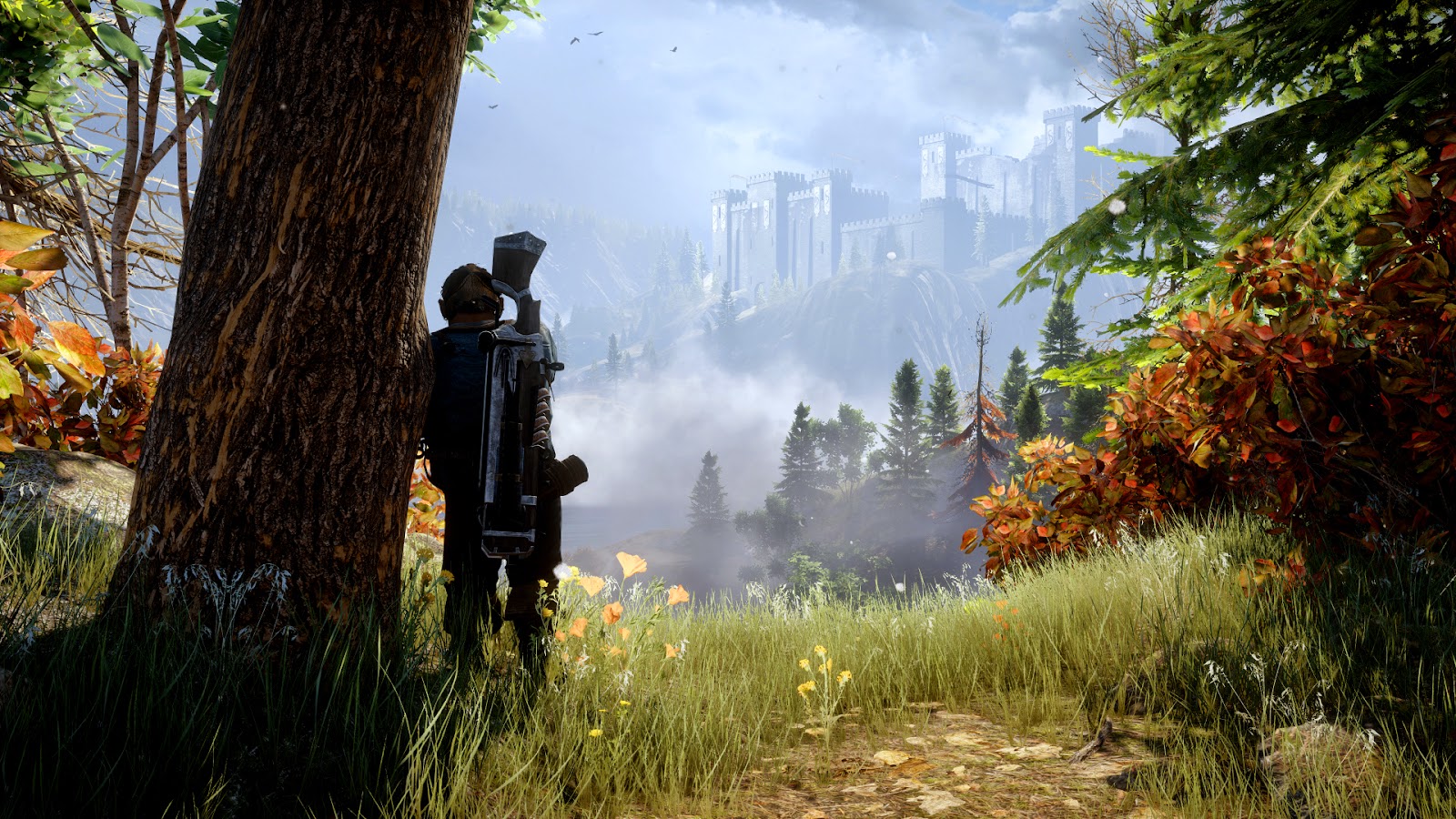Review by Matt S.
I love genuine RPGs, of the kind developed by a studio with a passion for recreating the classic pen-and-paper Dungeons & Dragons experience. These kinds of projects are sadly rare now, as the industry has gradually moved towards more linear narrative storytelling and action-based gameplay, but there are a couple of holdouts for which I am very grateful. The Elder Scrolls, for instance, continues to aim towards an open ended RPG experience, and while Dragon Age II suggested BioWare was sliding the wrong way towards ‘modern’ gaming trends, Dragon Age: Inquisition came to us with a promise that lessons had been learned and it would be a ‘classic’ BioWare project.
It doesn’t start well. Actually, that’s an understatement: the opening prelude to Dragon Age: Inquisition is miserable. I created my character and then she woke up with a magic mark on her hand and no idea what was going on. Supposedly under arrest she’s immediately let free and moments later finds herself with weapons that her supposed captor barely raises a protest to. I discover that this mark is the only way to close glowing green portals that are spawning demons across the realm and then, after recruiting a couple more allies, this new fellowship makes their way to a large portal and takes down an even bigger demon to shut the portal down. Everything has been apparently forgiven and my character goes from being the enemy to a hero of humanity in the span of an hour or so.
While mechanically sound (the introduction actually does do a good job of introducing players, regardless of skill or familiarity with the series, to the way Dragon Age: Inquisition will play), it’s appalling storytelling. Characters exhibit contradictory motivations (often within the same sentence of dialogue), and everything is delivered at such a scattershot pace that I was left wondering that if this was indeed the way that Inquisition was going to tell its story that I would be better off going back to a B-grade game like Bound by Flame that, while limited by budget, at least tried to tell a real story.
I shouldn’t have worried though. Quite literally the moment after the tutorial finishes and the game opens up, Dragon Age: Inquisition becomes one of the greatest RPGs you’ll ever play.
There’s a sense of scale about Inquisition that marks it as a truly modern, new-generation game. It doesn’t provide a true open world to explore, but it doesn’t need to. Rather, the world is split into large (no… huge) segments to explore and fight through. We’ve seen BioWare do this in the past – right back to Baldur’s Gate, in fact, and it’s a joy to behold since, as a consequence of cutting out the extraneous segments of land between the important areas, each of Inquisition’s environments are interesting from one corner to the opposite one. Unlike in a game like Skyrim there are no dull periods where you’ll be trekking over vast expanses of land with little to do. Each of Inquisition’s regions is littered with as many side quests and points of interest as in an an open world game, and players are largely left to their own devices when it comes to deciding what challenges they tackle, and what they ignore.
With that being said, I recommend exploring every inch of the land and completing every side quest, as with each one comes a new story or a snatch of lore that helps flesh out the amazing fantasy world that BioWare has created. The Dragon Age franchise is three (main) games in now, and BioWare now has access to a universe with a rich sense of culture and past events to draw on, and as we’ve seen with other long franchises (such as Elder Scrolls and its books), having a sense of genuine history is important to a fantasy epic. There’s no way to directly import characters from previous games into this one, but players can undertake an extensive survey (‘The Dragon Age Keep’) before they play that allows them to make key decisions that occurred within the previous two games. These decisions will affect what they encounter in this third game, so if you can remember all the decisions you made in the previous two games then you can play as though you have imported your save file. Don’t worry, new players, it’s not necessary to do this survey, and while you’ll miss some of the context if you haven’t played the previous two games, it’s not necessary to have done so to enjoy this game or its narrative.
The sheer size of the game also makes the relatively rapid delivery of dialogue that I found disappointing in the introduction make sense. With so many different things to do, if BioWare allowed everything to get bogged down with detailed dialogue and discussion trees, Inquisition would drag and become quite dull. Instead, the development team has wisely opted to deliver the maximum of characterisation within a minimum of words. A minimum of dialogue in a game that lasts 100 or more hours is still a lot of dialogue anyway, and while we’re not getting something that rivals Shakespeare through most of us, we do get a ripping digital equivalent of a page turner.
That’s also not to say the overall narrative lacks depth. Individual characters might be a touch on the generic (though some of them are hilarious) thanks to their relatively thin characterisation, but the epic narrative does delve into some pretty intense themes around morality and objectivity. Dragon Age: Inquisition operates on the assumption that there is no one “right” – people have different views on things and conflict arises when individuals with disparate views find the two incompatible. This is how we get notions of “good” and “evil”; they are opposite ideologies that have clashed.
In Inquisition there is an overarching villain – the demons and dragons and other primal forces of savagery – but as with the previous two games, they’re almost a background bit to the storytelling, or a catalyst for the real conflict: the conflict between the civilized peoples. There are some horrific conflicts between humans (and elves, dwarves and so on) and their ideologies, and somehow your hero will find him or herself in the thick of it each and every time, along with the demand that he or she take a side. As the plot progresses further the decisions become more and more challenging on both the mind and the sense of morality, and towards the end of the game I found myself questioning my own decisions over and over again, knowing full well that BioWare had some serious consequences in store regardless of the path I took.
As the quest progresses, your hero will attract a party of allies that will follow him or her into all of their conflicts, and they will also react to you based on your decisions. It’s impossible to keep the entire party happy with the directions you take and the alliances you form, and that’s depressing, because as standard as the characterisation are, it’s hard not to care about each and every one of them, and I constantly find myself disappointed with myself when I annoy any of them.
Dragon Age has always been fixated on the idea of human weakness, and that continues through into this game. It is a very Christian concept of human weakness. Demons are named after sins, and those sins are the sins that Christianity preaches against. The Black City, a unique location within the Fade – a place where the deceased and the dreaming travel to – is unreachable after its creator sealed it off following the curiosity of humans defiling it, and that a clear parallel to the Heaven of Christianity. Even the subtitle of the game – Inquisition – is a direct reference to something less than pleasant in the history in the religion. And so, even as Inquisition promotes a relativist understanding of human-to-human morality, there’s a move specific delineation in terms of spiritual morality.
These two different takes on morality combine to create quite a complex web to think though. Dragon Age might not be quite as philosophically dense as BioWare’s other key franchise (Mass Effect), but it comes close. The key difference is that Mass Effect, for all its promises of player agency, was more interested in telling a traditional end-to-end story, and therefore has a stronger story to tell, but Dragon Age: Inquisition offers a more pure degree of of player agency. Individuals are asked to write their own stories as they play, and as such no two campaigns though the game will be quite the same. With that in mind the developers have wisely decided not to dictate to them how to behave.
As you can probably guess from all that above, Inquisition goes into quite dark places. Supported by a Lord of the Rings-style dark fantasy aesthetic and some incredibly brutal combat, Inquisition doesn’t hold back on the violence, gore, or sex. But, equally impressively, in handles all of these themes with maturity and restraint. The violence is contextual, and the sex is handled in a completely natural manner. BioWare has always been good about this, but straight and homosexual relationships are present and naturalised within the game because they are an important part of life, and there is nothing more made of it than that.
The combat of Dragon Age: Inquisition has absolutely blown me away, and at a time where I have been concerned that BioWare was slowly evolving into a developer that produced exclusively action games. Dragon Age 2 and the Mass Effect series were all clear attempts to test the reflexes as much as the mind, but Inquisition has gone completely in the other direction. It’s still possible to play battles in real time (especially on the low difficulty levels), and the wide range of skills that each character class has access to makes this approach both visceral and entertaining, but that’s not the real way to play. No, with Inquisition you can, at any point, pause the action completely, issue orders to all of your characters, and then fast forward time a few seconds at a time. It allows control to the most minute degree over your team of heroes, and this is important on the higher difficulty levels because the AI that will automatically make decisions on how to behave when left on its own is not of a standard to take on the harder enemies. For the larger engagements Dragon Age: Inquisition has the tactical intensity of a game like XCOM, and this makes it one of the most pure recreations of the classic pen-and-paper experience that we’ve seen in some time.
On a purely technical level the game impresses as well. The frame rate isn’t consistent during cut scenes and the like, but on the ground it’s silky smooth and gorgeous. I wasn’t sure how Frostbite 3, an engine designed for shooters, would work for an RPG. I was wrong. It was initially off-putting with how non-interactive the environment is under this engine, but the benefit to using the engine is obvious: visually the scenery has appropriately epic draw distances, and incredibly subtle levels of detail that leave the impression that the world is a living, breathing one with both realistic architecture and ecologies.
BioWare achieved everything that it needed to with Dragon Age: Inquisition. It revitalised a series that had suffered real brand damage in Dragon Age II, and the third game in its fantasy trilogy easily stands as the best RPG we’ve seen in years. There is absolutely no reason to miss out on this one.
– Matt S.
Editor-in-Chief
Find me on Twitter: @digitallydownld


.jpg)










